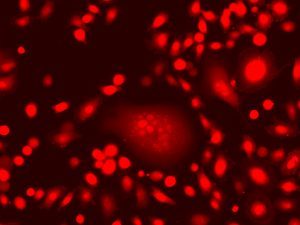From Outreach:
 Species adapt to survive in a changing environment through the process of evolution. Evolutionary processes can also take place at the cellular level. Dr Sarah Amend of Johns Hopkins University, Baltimore, USA, is investigating poly-aneuploid cancer cells (PACCs). These large, DNA-laden cells, which are more common in metastatic cancer, develop evolvability: the capacity to evolve. Dr Amend believes that targeting the evolvability of PACCs and exploiting cancer ecology could offer new potential treatment routes for patients with metastatic cancer. When a person dies from cancer, the cause is usually not the primary tumour, but the metastases. Metastases are secondary tumours that develop when cancerous cells leave the original tumour and travel to other parts of the body. Despite many recent advances in medical science, metastases are extremely difficult to treat. While people with metastatic cancer can sometimes survive for many months or years, the disease is almost always fatal, leading to the deaths of 10 million cancer patients globally every year.
Species adapt to survive in a changing environment through the process of evolution. Evolutionary processes can also take place at the cellular level. Dr Sarah Amend of Johns Hopkins University, Baltimore, USA, is investigating poly-aneuploid cancer cells (PACCs). These large, DNA-laden cells, which are more common in metastatic cancer, develop evolvability: the capacity to evolve. Dr Amend believes that targeting the evolvability of PACCs and exploiting cancer ecology could offer new potential treatment routes for patients with metastatic cancer. When a person dies from cancer, the cause is usually not the primary tumour, but the metastases. Metastases are secondary tumours that develop when cancerous cells leave the original tumour and travel to other parts of the body. Despite many recent advances in medical science, metastases are extremely difficult to treat. While people with metastatic cancer can sometimes survive for many months or years, the disease is almost always fatal, leading to the deaths of 10 million cancer patients globally every year.
New research avenues are needed to address the challenges of preventing and treating metastatic cancer. One novel idea is to apply the principles of evolution to cancer. While, for many people, the term ‘evolution’ might conjure up images of larger species – humans evolving from ape-like creatures, for example – the tenets of evolutionary biology also apply on a cellular level. Normally, cells do not simply operate on their own behalf; each cell has a specific function, which contributes to the survival of the whole organism. However, sometimes things go wrong. Unwanted genetic changes can create a cancerous cell, one that divides uncontrollably, leading to the growth of a tumour. Dr Sarah Amend, Assistant Professor of Urology and Oncology at Johns Hopkins University, and her colleagues believe that cancers might undergo convergent evolution – the process in which the same characteristics emerge in different species as a result of separate evolutionary processes. For example, both birds and bats have wings, but the feature arose as the result of separate evolutionary processes.
One type of cancer cell, called a poly-aneuploid cancer cell (PACC), could potentially represent a form of convergent evolution. These cells appear to be present in every type of cancer, in all patients with metastatic disease; they appear to be the ‘common denominator’ of all types of cancer. If this holds true, then the majority of lethal tumours converge on a single phenotype of lethality and resistance: one the research team thinks is due to PACCs.
More here.
